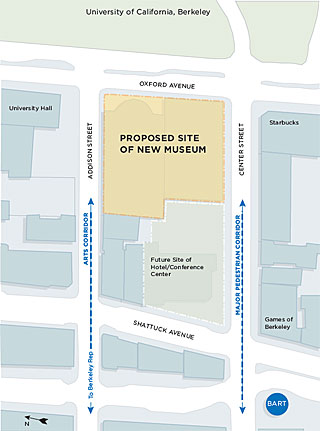UC Berkeley Press Release
UC Regents review preliminary conceptual design for new BAM/PFA
BERKELEY – The University of California Regents Committee on Grounds and Buildings today (Tuesday, March 18) got its first peek at Toyo Ito & Associates, Architects' preliminary conceptual design for a new Berkeley Art Museum and Pacific Film Archive (BAM/PFA) near the main western entrance to the UC Berkeley campus.
 Toyo Ito's conceptual designs include this inviting, street-level entryway to the Berkeley Art Museum/Pacific Film Archive in the heart of downtown Berkeley. |
Today's review required no action by the regents' committee. Over the coming months, BAM/PFA will continue to work with the architect to refine and detail the conceptual design. Later this year, more definitive plans will be presented to the regents for approval. Construction could be completed and the museum opened in 2013.
Planning for the new facility inside the city's bustling new arts district began after a structural analysis determined BAM/PFA's current space to be seismically inadequate. This led to the 1999 relocation of the Pacific Film Archive theater to temporary quarters on the UC Berkeley campus. A partial seismic retrofitting of the museum building in 2001 has enabled BAM/PFA to stay open during project planning and construction.
 The new museum would be located near the main western entrance to the UC Berkeley campus. |
Ito is the recipient of many awards, including the Arnold W. Brunner Memorial Prize in Architecture from the American Academy of Arts and Letters in 2000, and the prestigious Royal Gold Medal of the Royal Institute of British Architects in 2005. He founded Toyo Ito & Associates, Architects, in 1979.
The collection of the Berkeley Art Museum, which was founded in 1963, is known for its historical and contemporary Asian art; American folk art; mid-20th century conceptual and contemporary international art; and California and San Francisco Bay Area art. The collection of the Pacific Film Archive includes the largest group of Japanese films outside of Japan and an impressive selection of Soviet silent films, West Coast avant-garde cinema, seminal video art, rare animation, Eastern European and Central Asian productions, and international classics.
Funds for BAM/PFA's new building, which is projected to cost $145 million for construction, will come primarily from private sources. BAM/PFA trustees and staff are in the early stages of fundraising.

